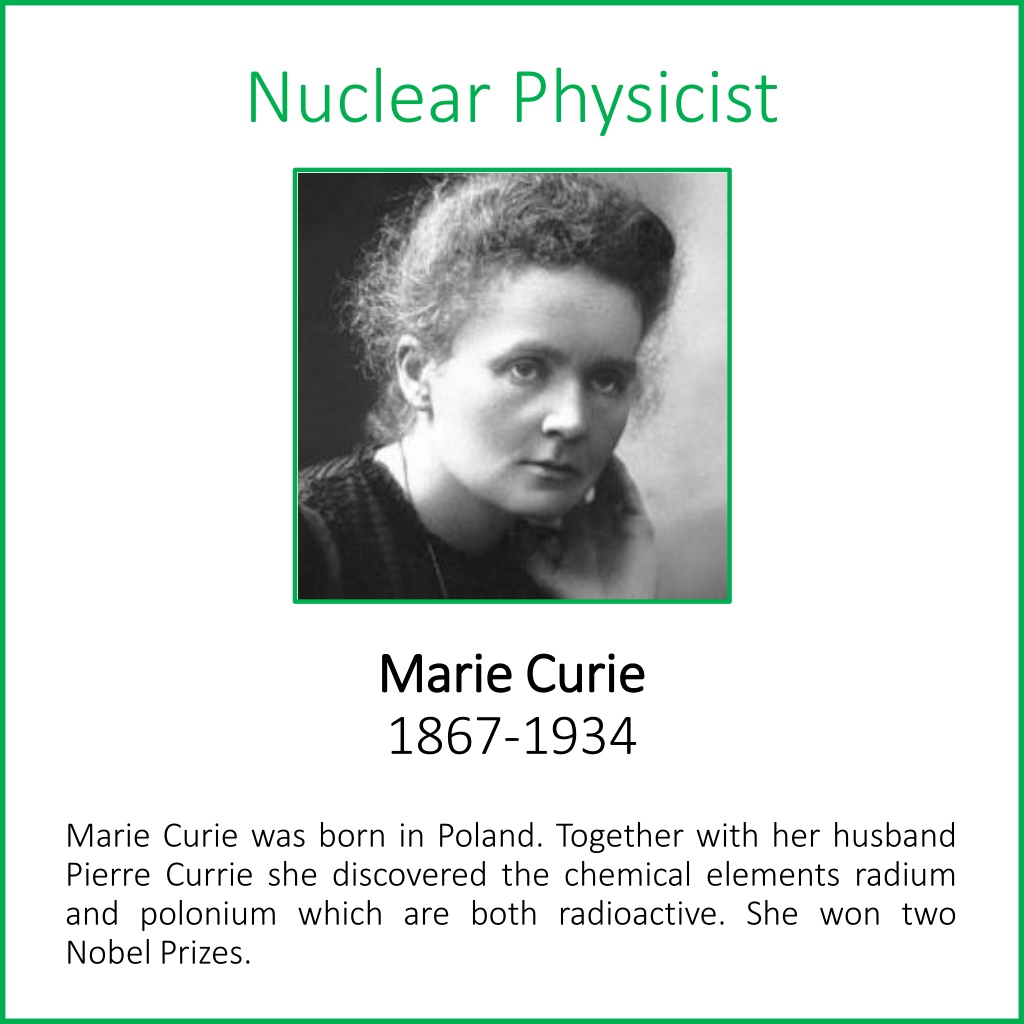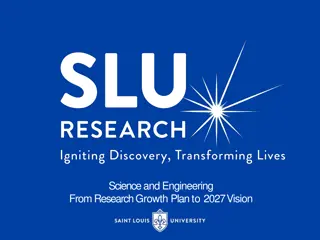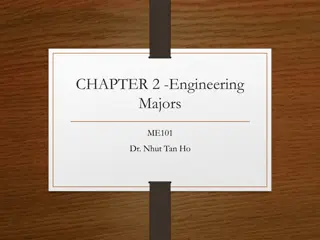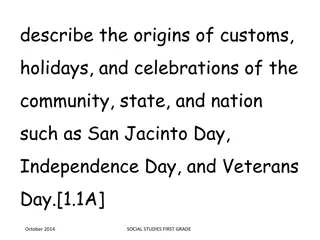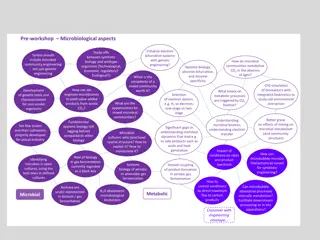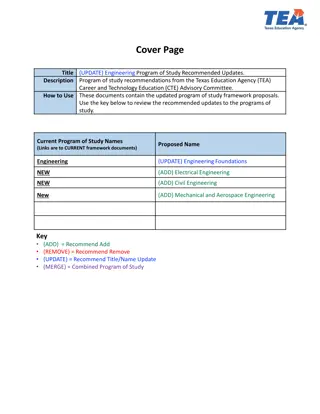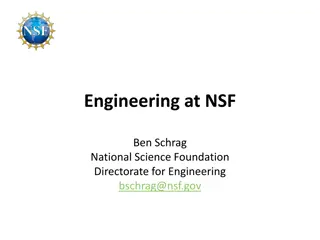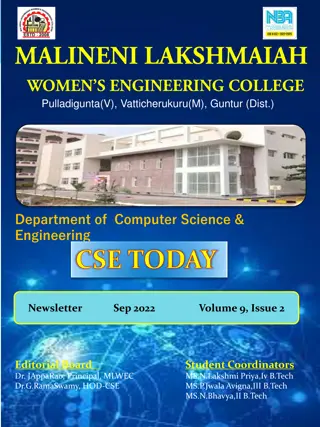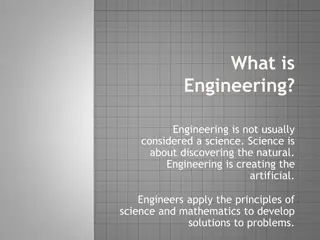Remarkable Figures in Science and Engineering
Explore the inspiring stories of pioneering figures in the fields of nuclear physics, aerospace engineering, chemistry, mathematics, and space exploration. From Marie Curie's groundbreaking discoveries to Elon Musk's innovation in technology, these remarkable individuals have left an enduring impact on science and engineering.
Download Presentation

Please find below an Image/Link to download the presentation.
The content on the website is provided AS IS for your information and personal use only. It may not be sold, licensed, or shared on other websites without obtaining consent from the author. Download presentation by click this link. If you encounter any issues during the download, it is possible that the publisher has removed the file from their server.
E N D
Presentation Transcript
Nuclear Physicist Marie Curie Marie Curie 1867-1934 Marie Curie was born in Poland. Together with her husband Pierre Currie she discovered the chemical elements radium and polonium which are both radioactive. She won two Nobel Prizes.
Nuclear Physicist Sau Sau Lan Wu Lan Wu 1940- Sau Lan was born in Hong Kong and, as a young scientist, she challenged herself to be involved in at least 3 major scientific discoveries. Among others, she contributed to the detection of the Higgs boson, the particle that gives matter mass.
Aerospace Engineer Mae Carol Mae Carol Jemison 1956- Jemison Mae Carol Jemison is an American engineer, physician, and former astronaut. She was the first black woman in space. She also wrote several books for children and appeared on television several times, including in an episode of Star Trek.
Aerospace Engineer Elon Musk Elon Musk 1971- Musk is a technology entrepreneur, investor, and engineer. He is extremely successful and has built up many companies including SpaceX, Tesla, and PayPal. Elon is a father of twins and triplets.
Chemist Stephanie Stephanie Kwolek 1923-2014 Kwolek Stephanie Kwolek was an American chemist known for inventing Kevlar - the material used to produce bullet-proof vests.
Chemist Ahmed Hassan Ahmed Hassan Zewail 1946-2016 Zewail Ahmed Hassan Zewail was an Egyptian-American scientist. He pioneered a technique to observe very short term and quick reactions - called femtochemistry. He received the Nobel prize for his work.
Mathematician Maryam Maryam Mirzakhani Mirzakhani 1977-2017 Maryam was a mathematician and the only woman to date to be honoured with the Fields Medal. She described herself as a "slow" mathematician. To solve problems, she drew doodles on sheets of paper and write mathematical formulas around the drawings.
Mathematician Katherine Johnson Katherine Johnson 1918 American mathematician whose calculations, among others, were critical for the success of the first crewed U.S space flight Apollo-11.
Crystallographer Dorothy Dorothy Hodgkins Hodgkins 1910-1994 Dorothy Hodgkin was a British chemist who developed protein crystallography, a technique that allows to see proteins in 3 dimensions. She won the Nobel Prize in Chemistry in 1964.
Crystallographer Rosalind Franklin Rosalind Franklin 1946 2016 Rosalind Franklin was a British chemist who made X-ray images important to discover the structure of DNA, the information that builds cells and consequently our body.
Electrical Engineer Edith Clarke Edith Clarke 1883-1959 Edith Clarke was the first woman in the United Sates to be employed as electrical engineer and the first female professor of electrical engineering in the country. She invented the Clarke calculator, a simple graphical device that solved equations
Electrical Engineer Nikola Tesla Nikola Tesla 1856-1943 Nikola Tesla is most well known for his contributions to the design of the modern, so-called alternating current (AC), electric supply system. He made multiple inventions and tried to develop wireless electric power distribution.
Computer Scientist Grace Hopper Grace Hopper 1906-1992 Grace Hopper was a renowned computer programmer. She popularized the idea to communicate with machines in English code instead of binary code, and revolutionized programming.
Computer Scientist Alan Turing Alan Turing 1912-1954 Alan Turing is often called the father of theoretical computer science. His model, the Turing machine is still used today to teach computer science.
Molecular Biologist James Watson James Watson 1928 James Watson together with Francis Crick wrote the academic publication proposing the double helix structure of the DNA molecule. Watson, Crick and Wilkins were awarded the 1962 Nobel Prize in Physiology or Medicine for their ground- breaking contribution.
Molecuar Biologist Elisabeth Blackburn Elisabeth Blackburn 1948- Australian born Elisabeth Blackburn studied chromosomes and discovered how the so-called telomeres protect the information our genes when cells divide.
Neuroscientist May May- -Britt Moser Britt Moser 1963- May-Britt Moser is a Norwegian neuroscientist. She discovered a new type of nerve cell, called a grid cell that allows animals to know their position in space. She received the Nobel price for her work.
Neuroscientist David David Eagleman Eagleman 1971- David Eagleman is an American neuroscientist, a best-selling author and a science communicator. He is known, among others, for his work on time perception.
Pharmacologist Alexander Fleming Alexander Fleming 1881-1955 Sir Alexander Fleming was a Scottish pharmacologist. His best- known discovery is the world's first antibiotic - penicillin.
Pharmacologist Gertrude Gertrude Elion 1918-1999 Elion Gertrude Elion was awarded with a Nobel Price together with Hitchings and Sir James Black for designing drugs. She develop the first immunosuppressive drug which means that it helps to switch off the immune system.
Geneticist Thomas Hunt Morgan Thomas Hunt Morgan 1866-1945 Thomas Morgan won the Nobel Prize for discovering how structures in our cell called chromosomes are important in heredity.
Geneticist Barbara McClintock Barbara McClintock 1902-1992 McClintock studied the genetics of maize and showed that genes are responsible for turning physical characteristics on and off. She obtained the Nobel Prize.
Statistician Florence Nightingale Florence Nightingale 1820-1910 Nightingale conducted pioneering work as a statistician. By collecting and analysing data, she found out that poor sanitary practices were the main culprit of high mortality in hospitals. With her work, she saved many lives.
Statistician Nate Nate Silver Silver 1978- Silver was named one of The World's 100 Most Influential People in 2009. He developed an election forecasting system by which he successfully predicted the election outcomes in 49 of the 50 states in the 2008 U.S. Presidential election.
Theoretical physicist Michio Michio Kaku 1947- Kaku Kaku popularization of science. He has written numerous books about physics and related topics, has made frequent appearances on radio, television, and film, and writes online blogs and articles. has made tremendous contributions to the
Theoretical physicist Stephen Hawking Stephen Hawking 1942-2018 Hawking was one of the most influential physicists of the 20th century and has among others, made ground-breaking contributions to our understanding about black holes.
Astronomer Tycho Brahe Tycho Brahe 1546 1601 Brahe was a Danish astronomer whose astronomical instruments made it possible to measuring and fixing the positions of stars his developments paved the way for future discoveries.
Astronomer Carolyn Carolyn Porco 1953 - Porco Porco is a leading expert in the exploration of outer space. She headed the imaging science team on the Cassini mission in orbit around Saturn from 2004 to 2017.
